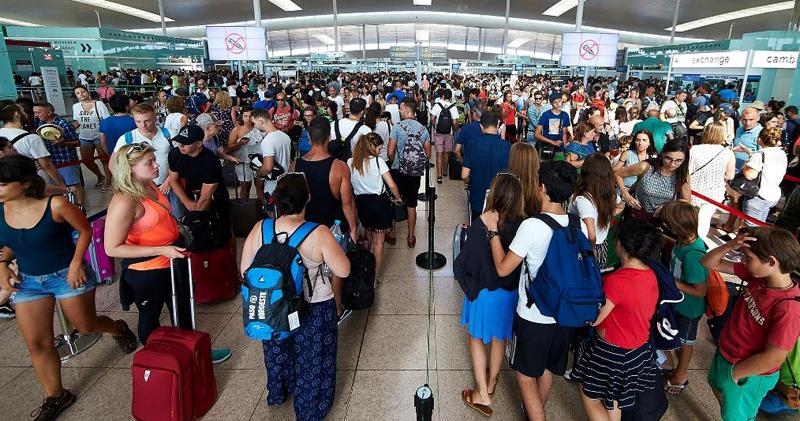
European officials have warned that Britain’s new blue passports could spell travel delays and extra paperwork rather than the enhanced freedom promised by the government.
Theresa May sought to end a difficult political year on a high note on Friday by confirming the return of navy travel documents after Brexit. She said that abandoning the EU-style burgundy design introduced in 1988 was an expression of “independence and sovereignty” that reflected “citizenship of a proud, great nation”.
But as the announcement divided domestic opinion along increasingly entrenched cultural battle lines, sources in Brussels pointed out that holders of any colour of British passport could see diminished travel rights after Brexit unless there were further negotiating concessions.
One senior official said that “depending on how negotiations go on all free movement issues after Brexit” there was a significant risk that British passport holders would lose the right to use a fast-track citizens lane when travelling on the continent and may also be obliged to use a new visa waiver scheme.
The EU travel information and authorisation system (Etias) is modeled on the US Esta scheme and could require British travellers to Europe to register in advance and make a small administrative payment.
Although a chance remains for Britain to retain fast-track privileges if there is further shift in the prime minister’s red lines on immigration, British experts said this looked unlikely. “At the moment, it looks absolutely certain that we won’t be able to go through the European citizens lane because the legal code in the Schengen borders code says it is only for citizens or people with free movement rights,” said Steve Peers, a professor of law at Essex University.
Brussels sources pointed out that the tendering process for printing the new passports was likely to take place under existing EU procurement rules, something that the current British contractor, De La Rue, recently warned could mean they were produced abroad.
Despite this, the announcement was loudly cheered by Brexit supporters on Friday after a string of recent concessions from the government.
The Home Office minister Brandon Lewis told the Sun that “one of the most iconic things about being British is having a British passport”.
“You can’t be a nation unless you have this symbol,” added a jubilant Nigel Farage.
Under a system first agreed by Margaret Thatcher’s government in 1981, Britain is not legally obliged to use the same burgundy design as most other members but agreed to do so in a joint resolution of member states in the European council.
The agreement to harmonise certain design features followed a backlash over more ambitious plans for a community-wide passport, but it also included rules to put the words “European Community” in front of the name of the member state.
Council members, including Britain’s then ambassador to the EU, Michael Butler, signed a resolution aiming to “strengthen the feeling among nationals of the member states that they belong to the same community” but left an opt-out clause that is still used today by some members such as Croatia, which also has a blue passport.
May said Britain was choosing to return to its “iconic” blue design even though the shade proposed would be significantly lighter than the near-black navy used in previous, larger, UK passports. The majority of changes since this period have been mandated by other international aviation and security agreements outside the EU and will continue to dictate the size and content of UK travel documents.
Experts stressed that the balance between national sovereignty and harmonising travel rules was more complex than changing the appearance of a passport. “The reality is that the new passports will symbolise having fewer free movement rights,” said Peers. “We will also still have to go through the slow lane even if we have non-expired [burgundy] passports. It may not be vastly more difficult, but it will be somewhat more difficult.
- Theguardian.com
